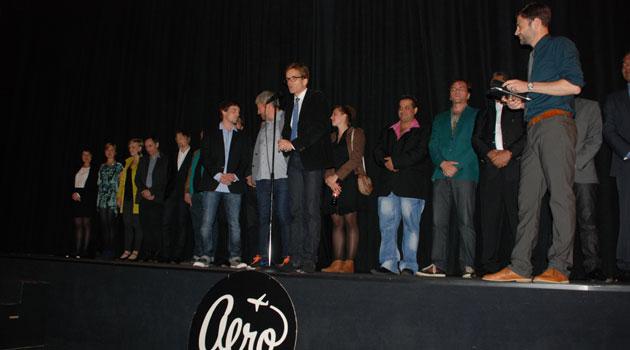Commentary: Where does "The Way Out" lead if almost no one cares?

The success of the film "The Way Out" (Cesta ven) may be having a paradoxical impact. Petr Václav’s movie about the life of Romani people in a ghetto has won the Czech Film Critics Award and was selected to represent Czech cinematography at last year’s Cannes Film Festival.
This might make it seem as if Czech experts, the Czech media, and in a way, even Czech society as a whole are open to a realistic view of the "Romani issue", that they appreciate and welcome it. The reality, however, is much simpler and much less flattering: Almost no one here is interested in this film.
To be fair, some are interested, a very narrow circle of people who can be easily guessed in advance: Activists and intellectuals involved in "Romani issues", fans of "art" films that are demanding and unusual, and fans of the director. Less than 4 000 people saw it in theaters last year.
For comparison’s sake, "Babovřesky 2" (Old Gossipton 2) was seen by roughly 70 000 people on its opening weekend and the comedy "Hodinový manžel" (Husband for an Hour), which is so light as to be trivial, was seen during its first few weeks by more than 140 000 people. Naturally there is no point in comparing how big the audience for an artistic "club" film is compared to that for "folk" comedies, irrespective of whether the film is about Roma or not.
It would be good, however, to avoid assuming that "The Way Out" has reached that part of society we usually call "the majority". We must not assume it has reached people who do not like the Roma and who shape the prejudices about them, who know little about their lives, who believe that most of them are responsible for their own problems, who believe it is best to treat them harshly and that the very best thing of all would be to just get rid of them somehow.
These people want the Roma at least removed from their own neighborhoods if they can’t be removed from the Czech Republic altogether. That is also a "way out" of its own sort.
No, "The Way Out" did not reach that type of person. It won’t reach them when it’s shown on Czech Television’s Channel Two, and they won’t be downloading it.
It would be very irresponsible and short-sighted to think of the success of this film as something earth-shaking, as something that can shatter stereotypes and unsettle the hopelessness of relations between the "majority" and the Romani minority here. True, more has been written about this film than has been written about comparable "club" films – because of Cannes, because of its themes, and now because of the Critics Award.
It could even win a Czech Lion next month. Most reviewers have been favorably inclined toward it, but far from all of them have, and here too we can guess who is praising it more than others.
Basically everyone has been recommending the film and praising the director as one of the biggest talents of contemporary Czech film. Less than 4 000 people went to see it as a result.
The film has not become an opportunity for public discussion, no politicians at either local or national level have latched onto it. Some public screenings of it were arranged by the Czech Government Agency for Social Inclusion, but the media paid almost no attention to that.
The media definitely paid much, much more attention to the film’s participation at Cannes. It’s as if it were more important to the Czech Republic whether a Czech film wins a prize at a festival than that we be able to begin addressing what may be our greatest contemporary problem.
This reminds me of the hopelessness of the discussion here about school reform. That discussion is about whether Romani children will receive an equal chance at education or whether they will continue to be sent to the "special schools".
Today there is an intensive discussion underway of paragraph 16 of the amendment to the Schools Act that is meant to open normal schools to all pupils with Politicians also seem to have ultimately forgotten that they must allocate enough money to this action. During one recent discussion in which the politicians were swearing that this time their plan would work, one of our leading experts on education, Ondřej Šteffl, emphasized that such change cannot be enforced without what he called a "massive state campaign".
"In the same way that we sell yogurt, it is also possible to sell the idea that dividing children between various types of schools is a mistake and that it harms the children. It’s not enough to just announce that this or that politician will not back down when faced with pressure to discriminate against some pupils. Public opinion must be ‘massaged’ through a powerful campaign. A campaign in that vein should be a component of a political program," Šteffl said.
Maybe it’s not as easy as it is with yogurt. However, that is why the experts and politicians should concentrate on this "sale" even more, and it evidently will require money.
Right now no one is even trying to sell this idea. No one, or almost no one, is interested in it – just like "The Way Out".